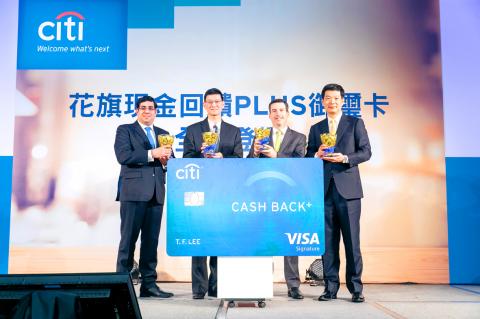Citibank Taiwan Ltd (台灣花旗) began its branded-cards business three decades ago. In 1989, the bank issued the first entry into Taiwan’s credit card market.
Citi established itself as the leading brand in the credit card market by initiating cashback rewards, pioneering privileges for multiple parties, and proposing that its cashback rewards, airline reward miles and bonus points never expire.
In an effort to continue improving the rights and interests of its cardholders, the bank is launching extra reward benefits for the “Citi Cashback PLUS Card”: New cardholders can enjoy a maximum of 4.5 percent reward points on overseas spending.

Photo courtesy of Citibank Taiwan Ltd
“Citi’s strong presence in the Asia-Pacific region and partnership with a number of well-known multinational corporate brands has been a great addition to consumer banking for Citi Asia Pacific,” said Gonzalo Luchetti, head of consumer banking for Citi Asia Pacific.
“Through the collaboration between consumer and institutional businesses, Citi aims to add 2 million new retail clients in the region. As a key market for the Asia-Pacific region, our credit card business in Taiwan will continue to strengthen cross-disciplinary cooperation with iconic brands. We will improve the rights and interests of our card members, thereby achieving the growth goal of Citi Asia Pacific,” Luchetti said.
Responding to regional strategies, Citibank Taiwan is committed to developing its partnerships.
This year, Citi card members can use their accumulated reward points to make redemptions from a complete suite of Apple Inc products on the Citi ThankYou Rewards digital redemption platform.
Citi has also connected with the Buy123 Market platform. This will enable its cardholders to purchase more than 7,000 selected items from the Buy123 Market on the movie ticket platform “Mobile Market App.”
In addition, Citi also worked with electric-vehicle maker Tesla to promote the benefits of buying new from it. Such a collaboration can benefit Citi card members and promote environmental sustainability.
While working with cross-disciplinary partners to create new benefits, Citi also launched the “Citi Cashback PLUS Card” in March. Without spending requirements, Citi cardholders can enjoy 0.5 percent cash back on general purchases, including auto top-ups of EasyCards.
They can also get an additional 1.5 percent cash rebate on the first NT$20,000 purchases with any brand each month at three major channels across Taiwan.
In addition, new “Citi Cashback PLUS Card” members can enjoy a 1 percent cash rebate on the first NT$10,000 of purchases per month until the end of this year.
Such benefits add up to 1.5 percent cash back on general purchases and a maximum of 3 percent cashback rewards on purchases at the three major channels.
Beginning on Tuesday and running through Dec. 31, “Citi Cashback PLUS Card” members can enjoy the 3 percent and 1 percent cash rebates for overseas spending in more than 160 countries and for insurance premium payments. There is no need to log in to receive the benefits.
For the new card members, the benefits equal 0.5 percent cash back on general purchases, and a 3 percent cash rebate on overseas spending in 160-plus countries, and 1 percent cashback rewards on purchases until the end of this year. That is a maximum of 4.5 percent in reward points.
The professionalism, innovative services and brand image of Citi’s consumer banking business are widely recognized.
Citi won the “Trusted Brand 2019: Credit Card Issuing Bank Gold Medal” from Reader’s Digest for the 12th consecutive year and the “Trusted Brand 2019: Wealth Management Bank Gold Medal” for the fourth consecutive year.

Taiwanese suppliers to Taiwan Semiconductor Manufacturing Co. (TSMC, 台積電) are expected to follow the contract chipmaker’s step to invest in the US, but their relocation may be seven to eight years away, Minister of Economic Affairs J.W. Kuo (郭智輝) said yesterday. When asked by opposition Chinese Nationalist Party (KMT) Legislator Niu Hsu-ting (牛煦庭) in the legislature about growing concerns that TSMC’s huge investments in the US will prompt its suppliers to follow suit, Kuo said based on the chipmaker’s current limited production volume, it is unlikely to lead its supply chain to go there for now. “Unless TSMC completes its planned six

Intel Corp has named Tasha Chuang (莊蓓瑜) to lead Intel Taiwan in a bid to reinforce relations between the company and its Taiwanese partners. The appointment of Chuang as general manager for Intel Taiwan takes effect on Thursday, the firm said in a statement yesterday. Chuang is to lead her team in Taiwan to pursue product development and sales growth in an effort to reinforce the company’s ties with its partners and clients, Intel said. Chuang was previously in charge of managing Intel’s ties with leading Taiwanese PC brand Asustek Computer Inc (華碩), which included helping Asustek strengthen its global businesses, the company

Power supply and electronic components maker Delta Electronics Inc (台達電) yesterday said second-quarter revenue is expected to surpass the first quarter, which rose 30 percent year-on-year to NT$118.92 billion (US$3.71 billion). Revenue this quarter is likely to grow, as US clients have front-loaded orders ahead of US President Donald Trump’s planned tariffs on Taiwanese goods, Delta chairman Ping Cheng (鄭平) said at an earnings conference in Taipei, referring to the 90-day pause in tariff implementation Trump announced on April 9. While situations in the third and fourth quarters remain unclear, “We will not halt our long-term deployments and do not plan to

The New Taiwan dollar and Taiwanese stocks surged on signs that trade tensions between the world’s top two economies might start easing and as US tech earnings boosted the outlook of the nation’s semiconductor exports. The NT dollar strengthened as much as 3.8 percent versus the US dollar to 30.815, the biggest intraday gain since January 2011, closing at NT$31.064. The benchmark TAIEX jumped 2.73 percent to outperform the region’s equity gauges. Outlook for global trade improved after China said it is assessing possible trade talks with the US, providing a boost for the nation’s currency and shares. As the NT dollar